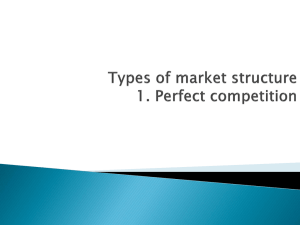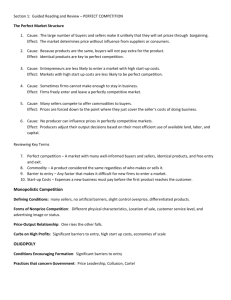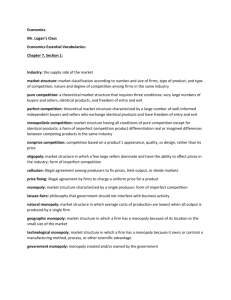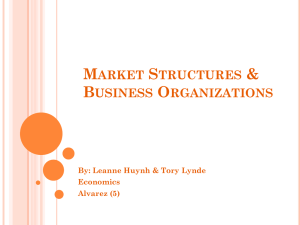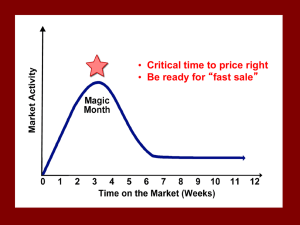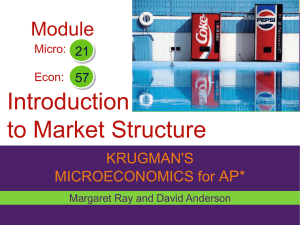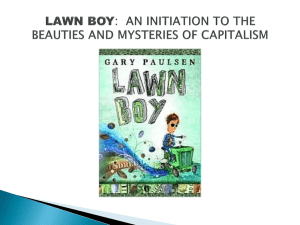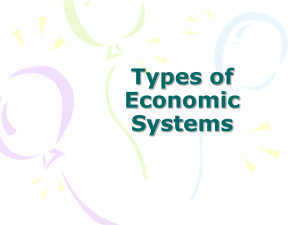Review
advertisement
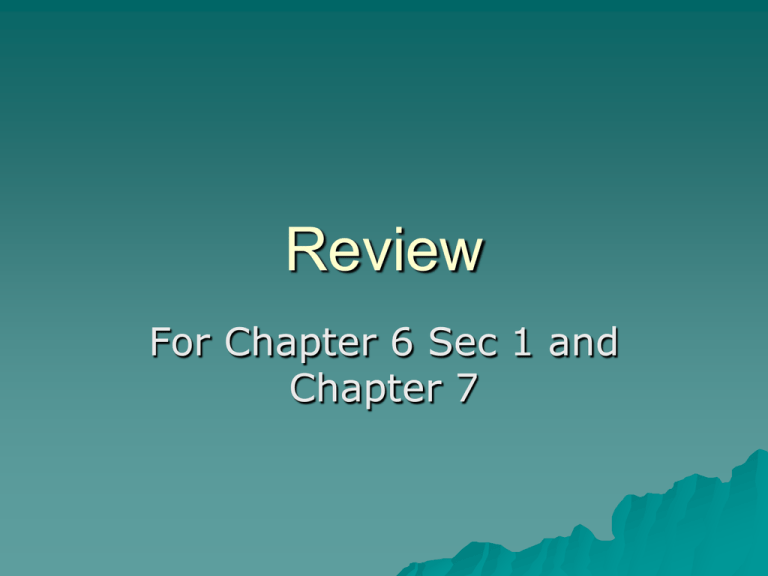
Review For Chapter 6 Sec 1 and Chapter 7 Question 1 What is monopolistic competition? A. very few companies selling identical products B. Many companies selling similar but not identical products C. One company selling several different products under different names D. One company selling the identical product under different names Question 1 What is monopolistic competition? A. very few companies selling identical products B. Many companies selling similar but not identical products C. One company selling several different products under different names D. One company selling the identical product under different names Question 2 What is the definition of an oligopoly? A. Eight to ten firms producing 60-70% of the output B. One firm producing 95% of the output C. Two to four firms producing 70-80% of the output D. Eight to ten firms producing 90% of the output Question 2 What is the definition of an oligopoly? A. Eight to ten firms producing 60-70% of the output B. One firm producing 95% of the output C. Two to four firms producing 70-80% of the output D. Eight to ten firms producing 90% of the output Question 3 How much control over price do companies in a perfectly competitive market have? A. None B. Very little C. Some D. Total Control Question 3 How much control over price do companies in a perfectly competitive market have? A. None B. Very little C. Some D. Total Control Question 4 When is a buyer NOT willing to spend a lot of time and energy researching the market? A. B. C. D. When prices vary but quality is the same When the savings to be made are small When there are many identical products available When buying a large quantity of goods Question 4 When is a buyer NOT willing to spend a lot of time and energy researching the market? A. B. C. D. When prices vary but quality is the same When the savings to be made are small When there are many identical products available When buying a large quantity of goods Question 5 Rent control is a type of A. B. C. D. Price Floor Rationing Price Ceiling Surplus Question 5 Rent control is a type of A. B. C. D. Price Floor Rationing Price Ceiling Surplus Question 6 How does a natural monopoly function? A. Imperfect competition makes it difficult for firms to do business B. The government supplies all buyers with the product C. A single firm supplies all the output D. A few firms are in perfect competition Question 6 How does a natural monopoly function? A. Imperfect competition makes it difficult for firms to do business B. The government supplies all buyers with the product C. A single firm supplies all the output D. A few firms are in perfect competition Question 7 When buyers will purchase exactly as much as the sellers are willing to sell, what is the condition that has been reached? A. Excess Demand B. Equilibrium C. Price Floor D. Supply and Demand Question 7 When buyers will purchase exactly as much as the sellers are willing to sell, what is the condition that has been reached? A. Excess Demand B. Equilibrium C. Price Floor D. Supply and Demand Question 8 What was the chief effect of the Sherman Antitrust Act? A. The federal government repealed regulations that controlled the airline and trucking industries. B. John D. Rockefeller formed the Standard Oil Trust as a protected natural monopoly. C. The federal government won the power to prevent monopolies and mergers that interfered with trade between states. D. Microsoft required personal computer manufacturers to include its web browser with the Microsoft Windows operating system. Question 8 What was the chief effect of the Sherman Antitrust Act? A. The federal government repealed regulations that controlled the airline and trucking industries. B. John D. Rockefeller formed the Standard Oil Trust as a protected natural monopoly. C. The federal government won the power to prevent monopolies and mergers that interfered with trade between states. D. Microsoft required personal computer manufacturers to include its web browser with the Microsoft Windows operating system. Question 9 Which of the following is NOT a condition for perfect competition? A. B. C. D. Sellers offer a wide variety of products Many buyers and sellers participate in the market Buyers and sellers are well informed about products Sellers are able to enter and exit the market freely Question 9 Which of the following is NOT a condition for perfect competition? A. B. C. D. Sellers offer a wide variety of products Many buyers and sellers participate in the market Buyers and sellers are well informed about products Sellers are able to enter and exit the market freely Question 10 What word goes with this definition? Situation in which quantity demanded is greater than quantity supplied Question 10 Shortage Question 11 What word goes with this definition? A minimum price for a good or service Question 11 Price Floor Question 12 What word goes with this definition? A market dominated by a single seller Question 12 Monopoly Question 13 What word goes with this definition? A product that is considered the same no matter who produces it Question 13 Commodity Question 14 What word goes with this definition? When quantity supplied and quantity demanded are not the same in a market Question 14 Disequilibrium Question 15 What word goes with this definition? Situation in which quantity supplied is greater than quantity demanded Question 15 Surplus Question 16 What word goes with this definition? The smallest amount, by law, that can be paid to a worker for an hour of labor Question 16 Minimum Wage Question 17 What word goes with this definition? A market structure in which a large number of firms all produce the same product Question 17 Perfect Competition Question 18 What word goes with this definition? Any factor that makes it difficult for a new firm to become part of a market Question 18 Barrier to Entry Question 19 What word goes with this definition? A license that gives the inventor of a new product the exclusive right to sell it for a certain period of time Question 19 Patent Other Test Items Numbers graph Number 20-23 are short answer with a 24 and 25 are short answer questions: What are the advantages and disadvantages of the minimum wage for workers? How do the four types of market structures differ?
